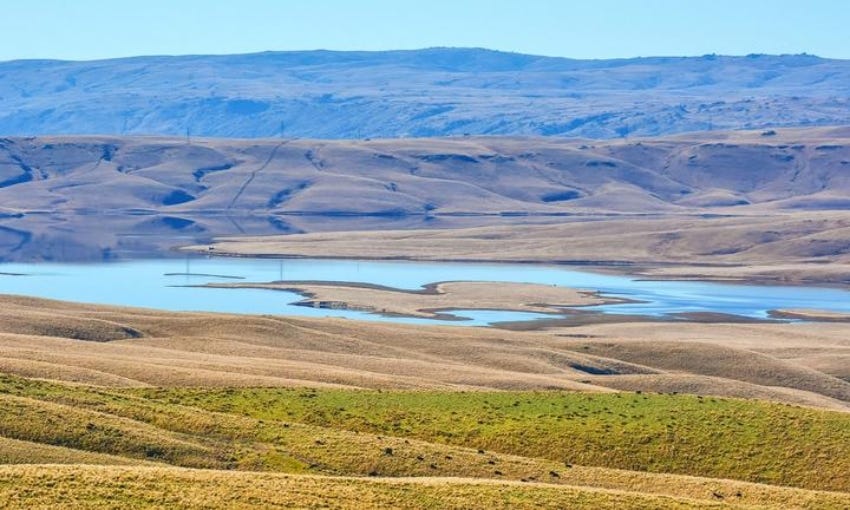For and against a massive new hydro storage scheme
At a whopping cost, the Lake Onslow scheme could change New Zealand forever

Good morning and welcome to The Bulletin for Thursday 30 July, by Alex Braae from The Spinoff. Presented in partnership with Z Energy.
In today’s edition: For and against a massive new hydro storage scheme, major new report delivered on RMA reforms, and Greens and NZ First at odds over waka-jumping repeal

Image: The man-made Lake Onslow in Central Otago (Wikipedia, Shellie Evans)
For a lead story today, a look at some of the benefits and challenges of a major potential infrastructure scheme being investigated. Some of this news will go back several days, but it's a fascinating project that there hasn't been a chance to cover yet in the Bulletin. The top line is this: Energy minister Megan Woods has put $30 million towards a business case to investigate whether the Lake Onslow pumped hydro storage scheme in Central Otago should go ahead, reports the ODT. A pumped hydro scheme differs from a dam in that water can be used depending on demand – when it is low, the water isn't used, and when it is high, there's plenty available.
The implications of this for renewable energy are huge. As Newsroom's Marc Daalder writes in an analysis piece, it would mean the country's electricity system could become purely renewable. No more coal power plants being flicked on during high demand – there'd be a storage scheme for that. In fact, it would likely generate so much clean electricity that a whole range of industrial processes could be electrified too, rather than relying on coal. You'd have to factor in some very high emissions to build the thing, but after that, it could have an immense impact in reducing the amount of carbon New Zealand pumps out. The storage would also help solve the 'dry year' problem that hydro schemes currently face.
Of course, it would also be colossally expensive. One figure thrown around in this piece by the NZ Herald's (paywalled) Grant Bradley is $4 billion, so you can assume in the final wash-up it would end up larger than that. It is described by an analyst in that story as an "overbuild" for what is needed, but would also have the effect of putting a long term mechanism in place that would keep electricity prices low. Other electricity industry stakeholders told Radio NZ that this particular scheme isn't worth it, and that same money would be better spent on multiple smaller schemes instead.
The relative remoteness of Lake Onslow also doesn't necessarily bolster the case. Household electricity demand is far higher in the upper North Island than anywhere else, which means high transmission costs, and National's energy spokesperson Jonathan Young has suggested that more development be put into Central Plateau geothermal schemes instead. There's also the question of who would build it, and where they'd live. The ODT has looked into this, and found the nearby town of Roxburgh wouldn't have anything like the necessary capacity – though it has been successfully done in the past, so wouldn't be impossible.
An exciting development for The Spinoff: We've now got merch for sale! You can check out everything we've got on offer here, but among other things we've got tea towels, pens, coffee cups, tote bags and T-shirts for sale. You can also buy copies of The Spinoff Book, which we released at the end of last year, featuring dozens of the best pieces of writing to appear on the site over our first five years. And of course, Spinoff Members get a discount on all of it, which you can sign up for here.
A major new report has been delivered into the Resource Management Act, recommending it be split into two, among other reforms. We've republished this piece from Business Desk editor Pattrick Smellie, which looks at the key points out of the report and reaction to it. In short, it has become too unwieldy and long, and nobody really knows how to fix that without breaking it down into more constituent parts.
A bill to repeal the controversial Electoral Integrity (waka-jumping) law is currently going through parliament. National and the Greens are both strongly against the legislation, but when it came in the Greens voted for it on the grounds that they had a good faith agreement to support NZ First priorities. Now they've changed their minds, and as Stuff reports, Winston Peters is absolutely fuming about it, saying the Greens have "demonstrated to voters that its word cannot be trusted. That is fatal.” The Greens in turn say their commitment to a piece of legislation they hated was fulfilled by their vote the first time around, and they're now free to do whatever they like. In any case, it could end up being totally academic – the repeal is a member's bill in the name of National MP David Carter, who is retiring at the election, so it may not be picked up again next term.
Wellington is facing a sharp rise in water demand, which within the decade could outstrip existing supply. The NZ Herald's Georgina Campbell reports it has led authorities to investigate whether water meters are needed for households. A parallel has been drawn with the situation in Auckland, where steady growth has meant that a decline in rainfall all of a sudden becomes a serious problem. Dealing with leakage will also be an important measure, though that'll be expensive. Campbell has also followed up on the local political reaction, with opinion on metering decidedly mixed.
The details were released on a charging scheme for managed isolation scheme yesterday, and many returnees will be exempt. Justin Giovannetti has a story with details on who will pay, and in basic terms, it will be those who leave after the system comes into place and then return, those who will be in New Zealand for less than 90 days, and NZers who come back home for a holiday. That won't necessarily work for everyone, and Newshub had a story about a dad who probably won't now be able to visit his kids in Australia, like he generally did during the school holidays. But on balance, it will be a less harsh regime than what otherwise might have come into place, with everyone having to pay.
Several people have spoken out about an allegedly toxic culture at filmmaking studio Weta Workshop, to One News reporter Kristin Hall. Bullying from managers was described as widespread, including "degrading comments to workers in front of a room full of people." Another person also complained of sexual harassment and inappropriate touching, which despite speaking out nothing was done about. Part of the issue that comes through the story is that the workplace is seen as so desirable, that people will put up with allegedly terrible treatment to be there.
Valedictory speeches are being made at parliament at the moment for retiring MPs. Yesterday, we heard from several National MPs, including a remarkable speech from outgoing MP Sarah Dowie. Among other points, she rightly unloaded on the press gallery for how they covered the news that she was under police investigation, for a text message sent at the end of an affair with fellow MP Jami-Lee Ross. She also thanked the colleagues – particularly other women MPs in National – who rallied around her in support.
Got some feedback about The Bulletin, or anything in the news?
Drop us a line at thebulletin@thespinoff.co.nz

Right now on The Spinoff: Emily Writes speaks to Susie Ferguson about a new project that carefully tells stories on a topic shrouded in silence – the death of a baby. Jenny Nicholls writes about how much more we can learn from the concept of contagion, and the reproduction rate of a virus. Emily Writes (again) speaks to new mums who gave birth during lockdown. Scotty Stevenson follows up the story of Joeli Vidiri, the remarkable rugby player whose career was destroyed by illness. And Henry Burrell reviews a new device that he credits with saving his productivity in working from home.
For a feature today, a stirring and accurate defence of a much-maligned type of journalism. At Canadian site Refinery 29, Carley Fortune has written about how lifestyle journalism is unfairly looked down on by seemingly everyone in the industry, with the implication being that it is because it is largely staffed by women. Here's an excerpt:
You get used to being treated as less-than when you work in lifestyle media while also facing pressure to bring home the bacon. You know that your best work will never get the accolades it deserves, and that male colleagues, bosses, and peers — and, heck, women too — think what you do is not important. They’re happy to keep you around as long as you’re making money, but you have to constantly justify your work as valid compared to other more prestigious journalism. There’s often a double-edge sword of feeling the pressure to attract advertisers without being given the resources to scale the audience while delivering quality content.
If you’re a lifestyle journalist, you might internalize this messaging, and worry about speaking to a group of aspiring journalists or appearing on a panel with more “serious” reporters. When I worked as a style editor at the Globe and Mail and was asked to apply for a national news editor job there, I did my very best to convince my bosses that I was completely unqualified. I couldn’t remember all the provincial capitals! I’d never done news! I ended up landing the job, then leaving for Chatelaine before I started. I didn’t think I was cut out for that kind of journalism.
Golfer Lydia Ko has got rid of yet another coach, bringing her tally to five different coaches since 2016. The NZ Herald has had confirmation from the latest casualty – New York based Jorge Parada – that he was out the door, but he said he wasn't entirely clear on the reasoning behind the decision. Ko is set to tee off this weekend in the restarted LPGA season, and has fallen down the world rankings into the 50s, after a long stretch at the very top.
That's it for The Bulletin. If you want to support the work we do at The Spinoff, please check out our membership programme




